 Headline News
Headline News
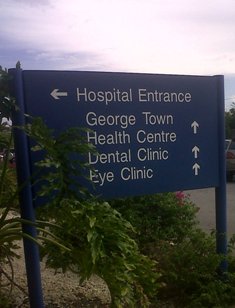
Healthcare takes centre stage
 (CNS): Government says it is planning a major national health care conference in November as part of its goal to improve the country’s health care system and see the industry play a part in developing the local economy. The Ministry of Health said the 11-13 November gathering will include insurance companies, patients, healthcare professionals, regulators and the Chamber of Commerce. Health minster Mark Scotland said the industry would be a future driver of growth. “It affects everyone, and our goal is to create a forum where we can bring together the divergent views, interests and collective intellect of all stakeholders with the benefit of international experts to develop a cohesive approach that will ensure a modern and sustainable healthcare system in the Cayman Islands” he added.
(CNS): Government says it is planning a major national health care conference in November as part of its goal to improve the country’s health care system and see the industry play a part in developing the local economy. The Ministry of Health said the 11-13 November gathering will include insurance companies, patients, healthcare professionals, regulators and the Chamber of Commerce. Health minster Mark Scotland said the industry would be a future driver of growth. “It affects everyone, and our goal is to create a forum where we can bring together the divergent views, interests and collective intellect of all stakeholders with the benefit of international experts to develop a cohesive approach that will ensure a modern and sustainable healthcare system in the Cayman Islands” he added.
“A Participative Approach in Setting the Agenda for Health” will cover topics such as Medical tourism and its impact on economic and social development; Chronic disease and implications for the islands’ future; Health insurance: affordability, coverage, portability; The impact of technology on healthcare delivery; Healthcare careers for Caymanians; The potential for public/private-sector partnerships in sustainable healthcare delivery and questions of the sustainability of current expenditure on healthcare.

Miller: Cut fees not rollover
 (CNS): The government’s increase in fees is far more of a problem for the country’s commercial community than the length of rollover, says the independent member for North Side. In the wake of announcements by the premier that the rollover could be reduced to as little as thirty days, Ezzard Miller said that he doubted very much that would constitute a genuine break in stay and, more importantly, immigration policy is not the cause of Cayman’s declining economic fortunes. Miller said that government should be reducing the cost of doing business not risky reductions to the break in stay that could result in Caymanians losing political control of their country.
(CNS): The government’s increase in fees is far more of a problem for the country’s commercial community than the length of rollover, says the independent member for North Side. In the wake of announcements by the premier that the rollover could be reduced to as little as thirty days, Ezzard Miller said that he doubted very much that would constitute a genuine break in stay and, more importantly, immigration policy is not the cause of Cayman’s declining economic fortunes. Miller said that government should be reducing the cost of doing business not risky reductions to the break in stay that could result in Caymanians losing political control of their country.

HRC falls short of standard
 (CNS): The composition of the Cayman Islands Human Rights Commission does not meet the Paris Principles, as adopted by the United Nations, when it comes to human rights institutions,, experts have said. Along with a number of other problems Cayman faces ahead of the implementation of its Bill of Rights in 2012, Desia Colgaon and Serlina Goulbourne, who visited Cayman last week, said the key elements of any human rights national institution are independence and pluralism. The experts who were here to offer free training to members of both the public and private sector said Cayman lacked a human rights culture, which would take some time to develop.
(CNS): The composition of the Cayman Islands Human Rights Commission does not meet the Paris Principles, as adopted by the United Nations, when it comes to human rights institutions,, experts have said. Along with a number of other problems Cayman faces ahead of the implementation of its Bill of Rights in 2012, Desia Colgaon and Serlina Goulbourne, who visited Cayman last week, said the key elements of any human rights national institution are independence and pluralism. The experts who were here to offer free training to members of both the public and private sector said Cayman lacked a human rights culture, which would take some time to develop.
The two women came to the islands as part of the Commonwealth Foundation and its project partners (the Commonwealth Legal Education Association, the Commonwealth Human Rights Initiative and the UK’s Department for International Development) to help raise awareness and offer assistance to the community at large about what human rights mean to a community.

Exam results up
 (CNS): Cayman Brac High School has had a banner year for exam results with 65% of the graduating Year 12 class obtaining five or more high level passes and 38% obtaining seven or more, parents were told at a PTA meeting last week. At a recent presentation to teachers on Cayman Brac, Education Ministry Senior Policy Advisor Clive Baker said that results for John Gray High School improved slightly over the previous year, with 38% of Year 12 students getting 5 or more high level passes, up from 36% on 2009. Historically, the average at CBHS has been just under 50% and about 24% at JGHS.
(CNS): Cayman Brac High School has had a banner year for exam results with 65% of the graduating Year 12 class obtaining five or more high level passes and 38% obtaining seven or more, parents were told at a PTA meeting last week. At a recent presentation to teachers on Cayman Brac, Education Ministry Senior Policy Advisor Clive Baker said that results for John Gray High School improved slightly over the previous year, with 38% of Year 12 students getting 5 or more high level passes, up from 36% on 2009. Historically, the average at CBHS has been just under 50% and about 24% at JGHS.
High level passes are described as Grades 1 to 3 in CXC or CSEC exams, and A* to C in GCSE exams, which are Level 2 on the new National Qualification Framework. The NQF is a chart showing the academic levels of achievement for the various external examinations that are taken by Cayman Islands students, which allows students, parents and potential employers to assess results on a nationally recognized scale (see NQF chart below). For example, a vocational BTEC Introductory course is the academic equivalent on the NQF as a CXC grade 4-6, while a BTEC First diploma is the equivalent of CXC grades 1-3.
While CXC/GCSE exam results improved in the Cayman Islands, in Britain GCSE pass rates continued to rise for 23rd year in a row. Though the equivalent results statistics are not available, the UK media reported that overall, 69.1% of all GCSE entries were awarded at least a C grade, up two percentage points on 2009, and 22.6% of entries achieved an A* or an A, up one percentage point on last year.
The Education Mnistry has not released results for the current Year 12 students on Grand Cayman (the first year group to take external exams at the end of Year 11) sayingthat these will be available next year when students have completed all their exams. However, these students now have a range of options available.
Baker said that around 20 Year 12 students at have chosen the Advanced Placement course, for which they must have at least 5 high-grade passes, including English and Maths, at A*-B/I-II grades. “This is a straightforwardly academic stream, aimed at the highest achieving students in the school,” he said.
AP better prepares students for university than the CXC/GCSEs, which are not designed to be pre-college courses. It also provides college credits for most US universities and in some cases could give students enough credit to skip the first year of a US bachelor’s degree, Baker said. Furthermore, as an accepted A-level equivalent, AP also offers a pathway to UK universities.
Advanced Placement courses are created by the College Board and are more rigorous than courses offered at US high schools. APs are individual subjects and college credit is usually given for a grade of 3 or above (5 being the highest).
According to the ministry, in future students must have passed exams at Level 3 on the NQF to qualify for a government scholarships for a bachelor’s degree. This includes the AP programme, but students can also take A-levels, which are offered at several local private schools, or an associate’s degree, which is offered at UCCI and ICCI.
There is around $2 million in this year’s budget for the Ministry of Education to construct a new building on Cayman Brac to house the restructured Year 12 group when it is introduced on that island, Baker revealed. While the restructuring of the high schools on Grand Cayman took place this year, and last year’s Year 11 have now started their new Year 12 options, the first year group on the Brac that will have the same opportunities is the current Year 9, who will choose their exam options at the end of this school year, at the same time as the Year 10 students.
However, CBHS Principal Adrian Jones told parents at a PTA meeting that BTEC courses in engineering, hospitality and music have already been introduced this year. These courses can lead to a Level 2 qualification on the NQF, he said.
To find out more about changes to the education system, go to the ministry’s blog, where there are PowerPoint presentations on what’s happening.
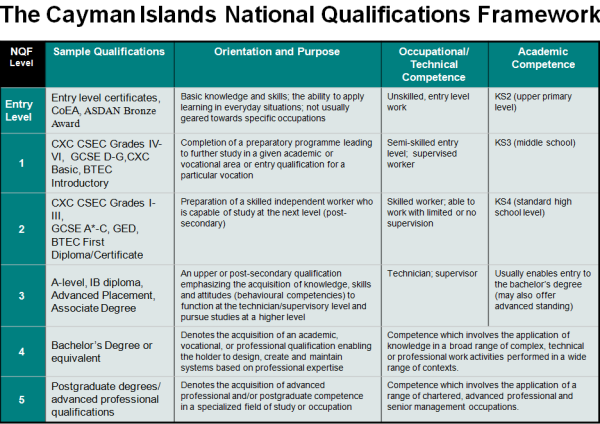

New Miss Cayman crowned
 (CNS): After a year’s absence the country now has a new Miss Cayman Islands. Tipped as a hot favourite to win, six foot, 23-year-old Cristin Alexander walked away with the pageant crown on Saturday night. Cristin is a recent graduate of the University of Western Ontario, where she earned a degree in psychology. Originally from Bodden Town, Cristin will now travel to China to represent Cayman in the Miss World pageant later this year. Shari Walton was First Runner-up for the title and Mysti Bush was Second Runner-up. Cristin also took the Best Legs title and Shari won Best Gown and Best Smile, Miss Photogenic went to Mysti and Miss Personality was awarded to Trudyann Duncan. (Photo by Dennie Warren Jr)
(CNS): After a year’s absence the country now has a new Miss Cayman Islands. Tipped as a hot favourite to win, six foot, 23-year-old Cristin Alexander walked away with the pageant crown on Saturday night. Cristin is a recent graduate of the University of Western Ontario, where she earned a degree in psychology. Originally from Bodden Town, Cristin will now travel to China to represent Cayman in the Miss World pageant later this year. Shari Walton was First Runner-up for the title and Mysti Bush was Second Runner-up. Cristin also took the Best Legs title and Shari won Best Gown and Best Smile, Miss Photogenic went to Mysti and Miss Personality was awarded to Trudyann Duncan. (Photo by Dennie Warren Jr)
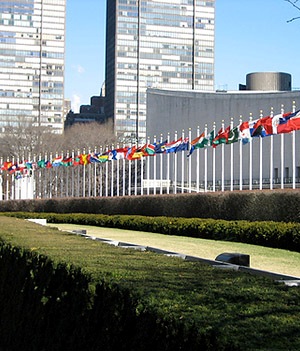
Bush tells UN to include CI
 (CNS): The Cayman Islands premier has told the United Nations to include Associate Members such as the Cayman Islands in regional assistance programmes and recommended making islands more competitive as the focus of the next stage of the Mauritius Strategy. Bush was speaking at the roundtable for the High-level Review Meeting on Implementation of the Mauritius Strategy in New York on Friday afternoon when hesaid islands such as Cayman were being left out of assistance programmes because of political or constitutional reasons. “The Mauritius Strategy for the Caribbean cannot be fully implemented if some islands are excluded on political or constitutional grounds. We are just as vulnerable to hurricanes, earthquakes and sea level rise as our neighbours,” Bush said.
(CNS): The Cayman Islands premier has told the United Nations to include Associate Members such as the Cayman Islands in regional assistance programmes and recommended making islands more competitive as the focus of the next stage of the Mauritius Strategy. Bush was speaking at the roundtable for the High-level Review Meeting on Implementation of the Mauritius Strategy in New York on Friday afternoon when hesaid islands such as Cayman were being left out of assistance programmes because of political or constitutional reasons. “The Mauritius Strategy for the Caribbean cannot be fully implemented if some islands are excluded on political or constitutional grounds. We are just as vulnerable to hurricanes, earthquakes and sea level rise as our neighbours,” Bush said.
The Mauritius Strategy is a programme of action for the sustainable development of small island developing states (SIDS). The meeting was opened by Ban Ki-moon on Friday morning when he spoke about the vulnerabilities small island developing states face unique as a result of their small size, isolation, narrow resource base, limitations on economies of scale, and high exposure to global environmental threats.
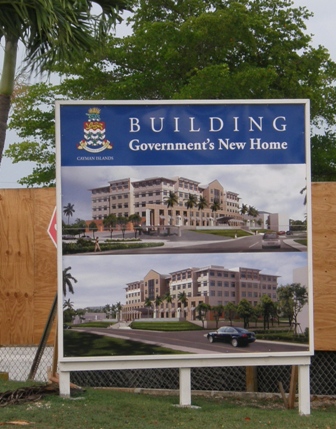
NRA to start Elgin Avenue road works
 (CNS): Traffic flows in parts of the capital are set to be disrupted until February next year as major road works begin along one of George Town’s main thoroughfares this month. The Ministry of District Administration, Works, Land and Agriculture has given the go-ahead to begin the Elgin Avenue road expansion related to the new administration building. Works Minister Juliana O’Connor-Connolly said the aim is to improve future traffic flow along the already busy road as well as public safety ahead of the opening of the government’s new office accommodation, situated next to the existing glass house.
(CNS): Traffic flows in parts of the capital are set to be disrupted until February next year as major road works begin along one of George Town’s main thoroughfares this month. The Ministry of District Administration, Works, Land and Agriculture has given the go-ahead to begin the Elgin Avenue road expansion related to the new administration building. Works Minister Juliana O’Connor-Connolly said the aim is to improve future traffic flow along the already busy road as well as public safety ahead of the opening of the government’s new office accommodation, situated next to the existing glass house.

Downtown bank robbed
 (CNS): Three masked suspects robbed the Fidelity Bank in Dr Roy’s Drive shortly before 10.00 this morning (Friday 24 September). Police said the men, who were all armed with what appeared to be firearms, entered the bank and threatened customers and staff, and witnesses said they told everyone to lie on the floor. The men then made off with a sum of cash. No shots were fired and, although no one was injured, staff and customers were left shaken by the ordeal. It is believed that the men responsible left the scene in a black coloured Jeep Compass. Police uniformed and armed officers immediately attended the scene. The RCIPS Air Operations Unit was also deployed to assist in the search for the suspects. (Photo by Dennie Warren Jr)
(CNS): Three masked suspects robbed the Fidelity Bank in Dr Roy’s Drive shortly before 10.00 this morning (Friday 24 September). Police said the men, who were all armed with what appeared to be firearms, entered the bank and threatened customers and staff, and witnesses said they told everyone to lie on the floor. The men then made off with a sum of cash. No shots were fired and, although no one was injured, staff and customers were left shaken by the ordeal. It is believed that the men responsible left the scene in a black coloured Jeep Compass. Police uniformed and armed officers immediately attended the scene. The RCIPS Air Operations Unit was also deployed to assist in the search for the suspects. (Photo by Dennie Warren Jr)
CID officers are still at the scene interviewing witnesses and a scene of crime examination is ongoing.
One suspect is described as having brown complexion, 6 feet in height, weighing about 180 pounds. He was wearing a white overall over his face and dark glasses. The second had a dark brown complexion, and was wearing denim pants and a white and grey coloured shirt. The third man had a dark brown complexion, and wearing a white shirt and dark pants. All three had their faces covered and were carrying what appeared to be firearms.
Brett Hill, Fidelity’s President & CEO, said, “We are assisting [police] with their enquiries and we are thankful that none of our customers or members of staff were injured in this incident. The branch will be closed for the rest of the day to allow the Police to continue with their investigations.” He added that customers requiring access to Fidelity’s services today may do so at either the Fidelity Financial Centre Branch on West Bay Road of at their Money Centre Branch on Godfrey Nixon Way. The Dr. Roy’s Drive Branch will re-open for business on Monday morning.
Anyone with any information about this crime should call George Town police station on 949-4222 or the confidential Crime Stoppers number 800-8477(TIPS).

Census aims for 100% cover of households
 (CNS): Organisers of the country’s census have said the goal is to have every single person in the Cayman Islands not only counted for an accurate population figure but for each household to answer a questionnaire as well. The national count begins on 10/10/10 Census Day when more than three hundred census workers will hit the streets and begin counting and interviewing in every home. People will be asked 67 questions, ranging from basic details about residents to chronic illnesses suffered by any members of the family. Costing around $1.1 million, officials say this count will provide Cayman with a comprehensive set of data that will be of enormous importance to both the private and public sector.
(CNS): Organisers of the country’s census have said the goal is to have every single person in the Cayman Islands not only counted for an accurate population figure but for each household to answer a questionnaire as well. The national count begins on 10/10/10 Census Day when more than three hundred census workers will hit the streets and begin counting and interviewing in every home. People will be asked 67 questions, ranging from basic details about residents to chronic illnesses suffered by any members of the family. Costing around $1.1 million, officials say this count will provide Cayman with a comprehensive set of data that will be of enormous importance to both the private and public sector.
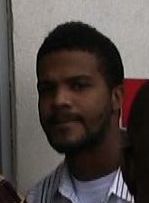
Man faces 3 murder charges
 (CNS): A West Bay man was charged with murder today (Thursday 23 September) in connection with the killing of Marcos Mauricio Gauman Duran in March of this year. Twenty-seven year old Raziel Omar Jeffers (left) now faces his third murder charge in four months, following charges made against him for the shooting of Damian Ming earlier this year and Marcus Ebanks in July 2009. Jeffers is also charged with the attempted murder of Adryan Powell, who was 14 at the time, also in July 2009. All three homicides were shootings which took place in the West Bay district and which police have said were gang related. (Photo courtesy of News27)
(CNS): A West Bay man was charged with murder today (Thursday 23 September) in connection with the killing of Marcos Mauricio Gauman Duran in March of this year. Twenty-seven year old Raziel Omar Jeffers (left) now faces his third murder charge in four months, following charges made against him for the shooting of Damian Ming earlier this year and Marcus Ebanks in July 2009. Jeffers is also charged with the attempted murder of Adryan Powell, who was 14 at the time, also in July 2009. All three homicides were shootings which took place in the West Bay district and which police have said were gang related. (Photo courtesy of News27)